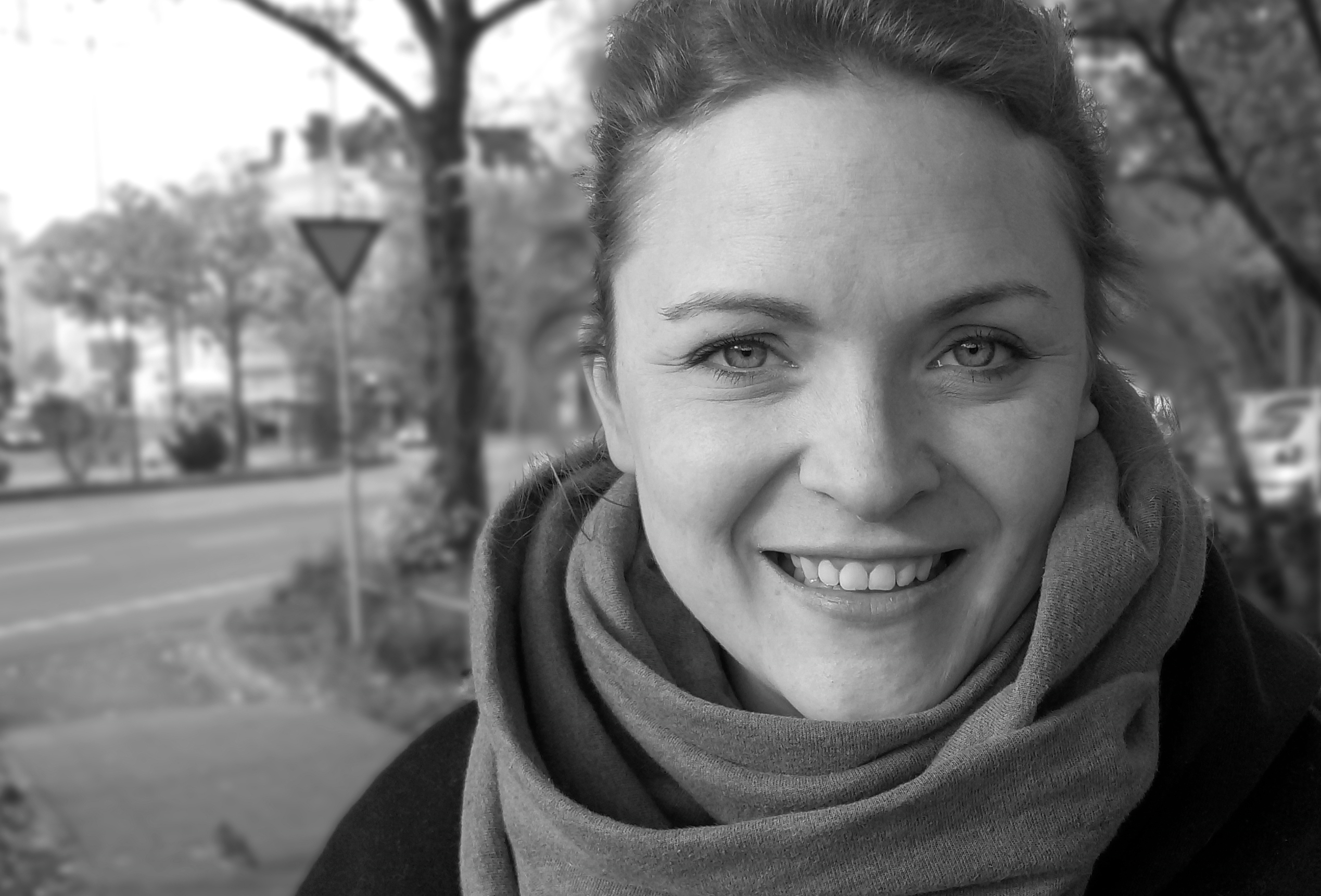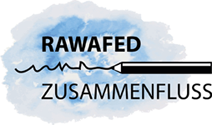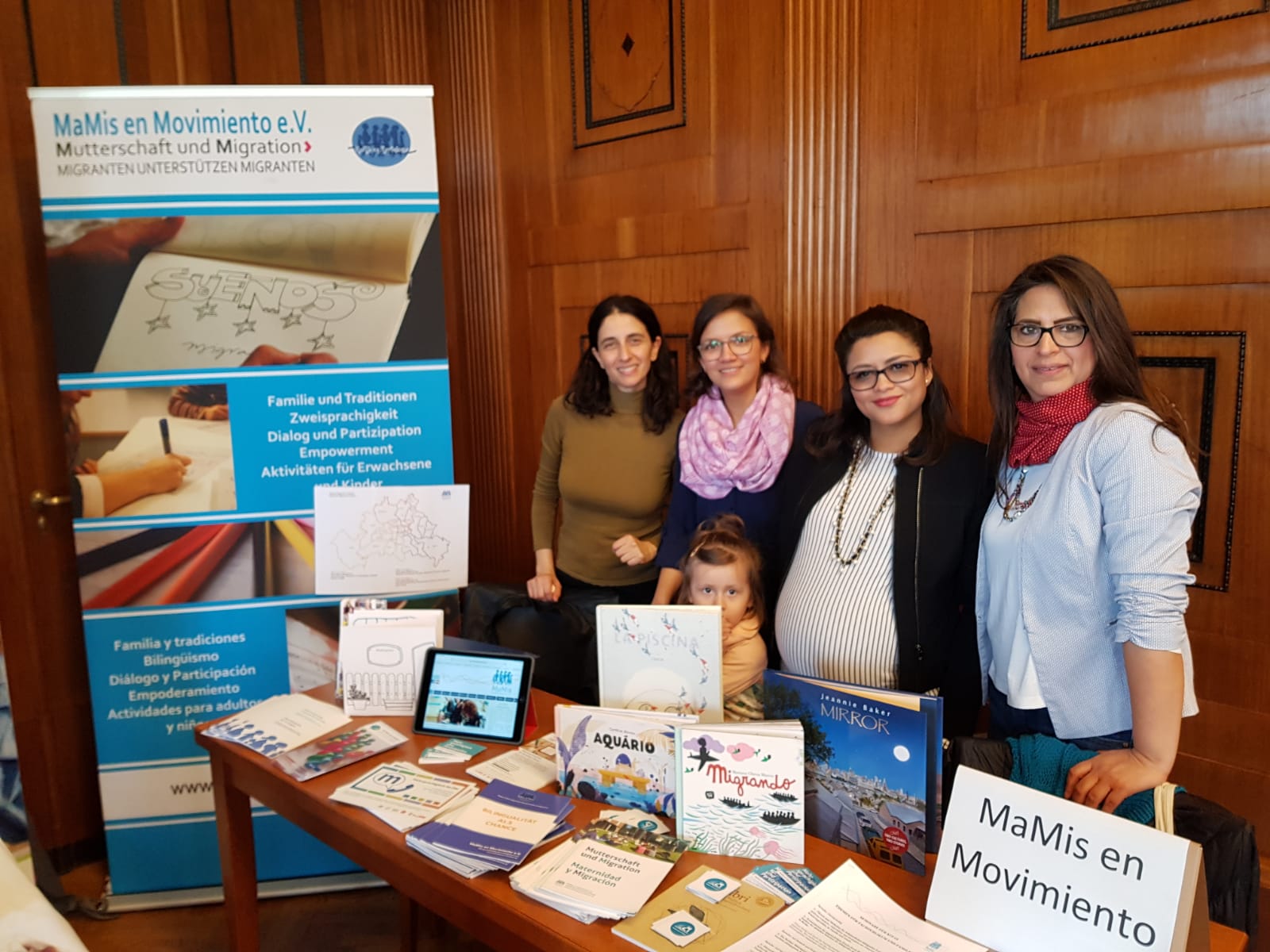Migrants don't want to just sit around!
SPANISH BELOW
The MaMis en Movimiento e.V. are an association of Spanish and German speaking people who support each other on very different topics. For some time now, they have been offering various services in Treptow-Köpenick, too. We met with them and talked about their origins and whishes for the future.
RawafedZusammenfluss: What do MaMis en Movimiento stand for?
Karina: We have two pillars: The regular activities and publicly funded projects. We started with very small grants. Last year we got support from the Senate. That was very important for our structure. Our regular activities focus on workshops for families. Bilingualism is at the centre of our work - also here in Köpenick. We are active throughout Berlin and Potsdam. Depending on our needs, we organize what we do. This process is very participative - for example, early musical education or telling fairy tales in different languages were ideas brought up by our community. Since we are an association for mainly Spanish-speaking families, we encourage children to playfully find out about their Spanish skills. We have a mobile library, a small reading case. But they are very difficult (laughs). If you are on the road with your children, you can't carry them so well.
RZ: Who will join you?
K: We are migrants, mostly with a pedagogical education. First we met in Prenzlauer Berg - on the playground, very relaxed. At ISI e.V. we were able to gain experience and found our own association. Multilingualism and participation were important from the beginning.
RZ: What does participation mean for you?
K: That is an important question. Without participation nothing would work for us. There are many concepts for this in our association. That's why I can't explain it in two sentences. We want to tackle challenges ourselves. Our idea is to give women and families tools to empower them by giving them the opportunity to speak in their own language. To us, there is no "project from above". Instead, we look at what each person's experiences are, what skills they have, for example when it comes to our local coordinators - Sarahí Sanchez did it for Köpenick.
Andrea: But in Köpenick it is very different from the other districts. There we have a coordinator and a manager. The coordinator has very close contact with the families and motivates them to take part in the workshop. As a project leader I look for the support of the district or other organizations for our activities and organize everything around it. Sarahí Sanchez simply has a very good contact to the families, but unfortunately she has no more time for the bureaucratic work because she started working again and then became pregnant.
RZ: So you designed the structure around her? That's rather unusual.
K: Yes, but we have also grown. Flexibility needs a framework - we're beginning to notice that. We're thinking a lot about our structure right now. But we want to retain that flexibility!
RZ: You have grown quickly, haven't you?
A: I tell it best by my story. When I came to Berlin, I felt very lonely and also wanted to have Spanish for my children in their everyday life. Then I got to know the MaMis. If you join in, the families will give you what you need! This feeling makes you feel at home. We have families from Latin America, from Spain. It feels like we are one big family.
K: We care a lot about the emotional level and strengthen women in their development, also professionally. We use our own social capital. Everything is new - to us, too. We didn't come empty handed though. Our seminars are about empowerment e.g. by dealing with racism and discrimination but also about getting to know what's possible. How can we be part of Berlin society? Not as victims, not passively, but actively. Recently, we have also become a recognised provider of youth welfare services and a member of the Paritätischer Verband.
A:We are also part of the VIA network.
RZ: So networking is important to you?
A: Of course. We profit a lot from it. The associations are always approachable. We get a variety of information. For the associations on the other hand it is also important to see how civil society is changing.
K: Absolutely! We are very happy to participate in various working groups at local level, for example in Pankow and Marzahn-Hellersdorf. For us, thisis what participation is all about - sharing our view of things where decisions are made. This makes us and our work less abstract. Committees are simply important. You have to be visible.
RZ: Treptow-Köpenick unfortunately does not yet have an integration committee.
A: I think that in Treptow-Köpenick we are currently experiencing the moment when many migrants are newly joining and organising themselves. We are a strong group. Migrants don't want to be passive, they want to get actively involved. It is our new home. When we need leaders, I always look for them in the district. Often, women bring a migration biography with them and they don't just want to sit at home. Volunteering helps a lot!
RZ: What can we expect from you this year?
A: The children workshops: Live, dance and play in your language: Children between 0-6 years read and write in Spanish: School children in JuJo. On October 20 .2019 at 10:30 am, the seminar "German Education System" will take place. (in Spanish). The 2nd part of the moving workshops for women with and without migration and refugee experience and the multilingual fairy tale days in November in cooperation with the libraries. Next year, by the way, we would like to organize language tandems again. If you feel like it, feel free to get in touch with us!
RZ: That's a lot of events! We are very happy to have such active neighbours and wish you continued success. Thank you for the interview!
This interview is part of the series "Talking to Powerful Women", initiated by Rumeysa Yalazan, who is currently doing an internship at RawafedZusammenfluss.
__________________________________________-
Las mujeres migrantes activas!
Las MaMis en Movimiento e.V. es una asociación de personas de habla hispana y alemana que se apoyan mutuamente en diferentes temas. Desde hace algún tiempo, ofrecen diversos servicios en Treptow-Köpenick. Nos reunimos con ellas y hablamos de sus orígenes y de lo que el futuro les depara.
RawafedZusammenfluss: ¿Qué hace MaMis en Movimiento e.V.?
Karina: Tenemos dos pilares: Las actividades regulares y los proyectos financiados. Al principio empezamos con subvenciones muy pequeñas. El año pasado recibimos el apoyo del Senado. Eso fue muy importante para nuestra estructura. Nuestras actividades regulares se centran en talleres para familias. El bilingüismo está en el centro de nuestro trabajo, también aquí en Köpenick. Pero estamos activas en todo Berlín y Potsdam. Dependiendo de las demandas de la comunidad hispanohablante, organizamos lo que ofrecemos. Esto es muy participativo - por ejemplo, educación musical temprana o contar cuentos infantiles en diferentes idiomas. Como somos una asociación para familias principalmente hispanohablantes, animamos a los niño/as a que se desarollen de forma lúdica sus conocimientos de español. Tenemos una biblioteca móvil, un pequeña maleta de lectura.
RZ: ¿Quienes se únen a ustedes?
K: Somos mujeres migrantes, en su mayoría con educación académica y con hijo/as. Primero nos conocimos en Prenzlauer Berg, en una plaza, de manera informal. En ISI e.V. pudimos adquirir experiencia y fundar una propia asociación. El multilingüismo y la participación fueron importantes desde el principio.
RZ: ¿Qué es la participación para ustedes?
K: Esa es una pregunta importante. Sin participación nada funciona para nosotros. Hay muchos conceptos para esto en nuestra asociación. Por eso no puedo explicarlo en dos oraciones. Nos gustaría abordar el trabajo nosotras mismas. Nuestra idea es dar a las mujeres y a las familias herramientas para empoderarlas. Dándoles la oportunidad de hablar en su propio idioma. No hay ningún proyecto desde arriba. En vez de eso, miramos lo que son sus experiencias, lo que traen consigo y pueden aportar. Por ejemplo, nuestras coordinadores locales, en Köpenick Sarahí Sanchez. Ella era la interfaz entre la oficina de integración y los participantes.
Andrea: Pero en Köpenick es muy diferente de los otros distritos. Allí tenemos una coordinadora y una líder de proyecto. La coordinadora tiene un contacto muy estrecho con las familias y las motiva a participar en los talleres. Como líder de proyecto. yo busco el apoyo económico del distrito o de otras organizaciones para nuestras actividades y organizo todo a su alrededor. Pero trabajamos juntas. Sarahí Sánchez es muy importante porque tiene muy buen contacto con las familias, pero desafortunadamente ya no tiene tiempo para el trabajo burocrático, empezó a trabajar de nuevo y luego quedó embarazada.
RZ: ¿Así que han adaptado la estructura al contexto? Eso es bastante inusual.
K: Sí, pero también hemos crecido. La flexibilidad necesita un marco de trabajo - estamos empezando a darnos cuenta de ello. Estamos pensando mucho en nuestra estructura en este momento. Pero queremos mantener esa flexibilidad!
RZ: Han crecido rápido, ¿verdad?
A: Lo digo mejor por mi historia. Cuando llegué a Berlín, me sentí muy sola y también quería tener actividades en español para mis hijos en la vida diaria. Entonces conocí a las MaMis. Si te unes, las familias te darán lo que necesitas! Esta sensación te hace ser parte de la asociación. Tenemos familias de América Latina, de España. Es un ambiente muy familiar.
K: Nos preocupamos mucho por el nivel emocional y fortalecemos a las mujeres en su desarrollo, también profesionalmente. Utilizamos nuestro propio capital social. Tenemos que reorientarnos, pero traemos mucho con nosotras. Todo es posible con nosotras. Nuestros seminarios tratan sobre el empoderamiento y la lucha contra el racismo y la discriminación. ¿Cuáles son nuestras posibilidades? ¿Cómo podemos formar parte de la sociedad berlinesa? No como víctimas, no pasivamente, sino muy activamente. Recientemente, también nos hemos convertido en un proveedor reconocido de servicios de asistencia a la juventud y en miembro de la Paritätischer Verband.
A: De VIA e.V. también somos miembros!
RZ: Entonces, ¿construir redes es importante para ustedes?
A: Por supuesto. Nos beneficiamos mucho de ello. Las asociaciones son siempre accesibles. Obtenemos otra información.
RZ: Para los funcionarios también es importante ver cómo está cambiando la sociedad civil.
K: ¡Por supuesto! Estamos muy contentos de participar en varios grupos de trabajo a nivel local, por ejemplo en Pankow y Marzahn-Hellersdorf. Para nosotros, eso también significa participación, es decir, aportar nuestra visión de las cosas. Esto nos hace, a nosotras y a nuestro trabajo, menos abstractas. Nosotros y nuestros temas son tomados en cuenta. Los gremios son importantes. Tienes que estar presente para que la política piense en tí.
RZ: Treptow-Köpenick lamentablemente no tiene todavía un comité de integración.
A: Creo que en Treptow-Köpenick estamos viviendo el momento en el que muchos inmigrantes están llegando y organizándose. Eso vendrá. Somos un grupo fuerte. Muchos también vienen de otros distritos a nuestros talleres. Lo/as Migrantes no quieren ser pasivo/as, quieren involucrarse activamente. Es nuestro nuevo hogar. Cuando necesitamos talleristas, siempre las busco en el grupo del distrito. A menudo tenemos mujeres que traen consigo una historia de migración y no sólo quieren quedarse en casa. El comienzo profesional se retrasa a menudo. El voluntariado ayuda mucho! Lo principal es la practicidad.
RZ: ¿Qué podemos esperar de ustedes este año?
A: Dos talleres para niños: Vive, baila y juega en tu idioma: Para niños de 0 a 6 años y Lengua escrita en español: Para niños escolares en el JuJo.El 12.10.2019 a las 10:30 tendrá lugar el seminario "Sistema Educativo Alemán" (en español).La segunda parte de los talleres de baile para mujeres refugiadas con y sin experiencia de migración. Los cuentacuentos en diferentes idiomas en noviembre en cooperación con las bibliotecas y centros familiares. El año que viene, por cierto, nos gustaría volver a organizar tandems. Quienes lo deseen, pueden ponerse contacto con nosotras.
Eso es una abundancia de eventos! Estamos muy contentos de que ustedes esten en el distrito y le deseamos mucho éxito. Gracias por la entrevista!'
Esta entrevista forma parte de la serie "Hablando con mujeres poderosas", iniciada por Rumeysa Yalazan, que actualmente está haciendo una pasantía en RawafedZusammenfluss.

Katha koordiniert InteraXion, Willkommensbüro und Wohnraumberatung für Menschen mit Migrations- und Fluchterfahrung in Treptow-Köpenick. Sie begleitet RawafedZusammenfluss von hauptamtlicher Seite. Journalistische Erfahrung konnte sie durch verschiedene Projekte der Jugendpresse und dem Studierendenmagazin UnAufgefordert sammeln. Wenn sie nicht nach neuen Geschichten sucht, tummelt sie sich in Boulderhallen.
Katha coordinates InteraXion, the welcome office for migrants* and refugees in Treptow-Köpenick and accompanies RawafedZusammenfluss through her work. She gained journalistic experience through various youth press projects and the student magazine UnAufgefordert. When she is not looking for new stories, she spends her time in bouldering halls.









